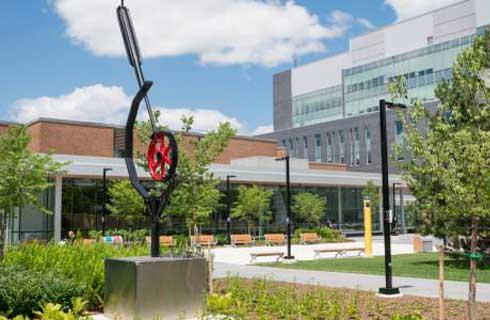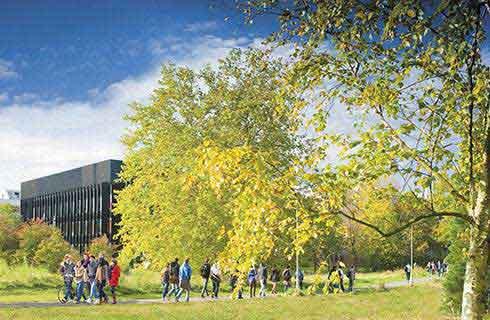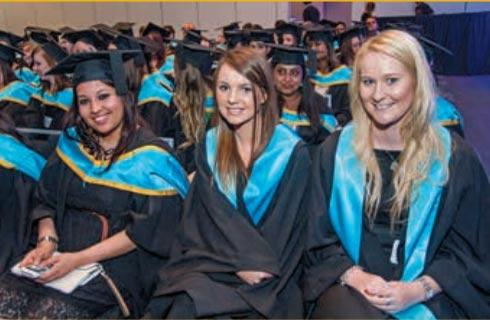理学学士(荣誉)海洋生物学
BSc (Hons) Marine Biology

学历文凭
Bachelor Degree with Honours

专业院系
Undergraduate Earth and Ocean Sciences

开学时间

课程时长

课程学费

国际学生入学条件
A levels
ABB
including Biology and one other science.
Applicants with the Extended Project Qualification (EPQ) are eligible for a reduction in grade requirements. For this course, the offer is BBB with A in the EPQ.
T levels
T levels are not currently accepted.
GCSE
4/C in English and 4/C in Mathematics
Subject requirements
Biology and one other science (Mathematics, Further Mathematics, Economics, Physics, Chemistry, Geography, Geology, Environmental Science/Studies/Technology*, Applied Science (Double Award), Computer Science) at A level.
*Not in combination with each other
For applicants from England: For science A levels that include the separately graded practical endorsement, a "Pass" is required.
BTEC Level 3 National Extended Diploma
D*DD in a relevant subject.
Relevant subjects considered include: Animal Management, Countryside Management, Applied Science, Marine Biology, and Ecology.
If the BTEC you are taking is not listed here, please contact us to check its acceptability for this programme.
Please note that BTEC Forensic Science pathway is not acceptable for this programme.
International Baccalaureate
33 including 6 at higher level Biology, plus another Science at Higher Level grade 5, no score less than 4.
Irish Leaving Certificate H1, H2, H2, H2, H3, H3 including H2 or above in Biology and a second science
Scottish Higher/Advanced Higher
Not accepted without Advanced Highers at ABB including Biology and 1 other science.
Welsh Baccalaureate Advanced Accepted at Grade B with AB at A levels including Biology and 1 other science.
Access 45 Level 3 credits in graded units,including 30 at Distinction and a further 15 with at least Merit. 15 Distinctions in Biology and one other science are typically required. Acceptable science subjects are Mathematics, Physics, Chemistry, Geography or Geology. GCSE Mathematics and English grade C/4 also required.
IDP—雅思考试联合主办方

雅思考试总分
6.0
- 雅思总分:6
- 托福网考总分:78
- 托福笔试总分:
- 其他语言考试:
CRICOS代码: C160
申请截止日期: 请与IDP联系 以获取详细信息。
课程简介
From microscopic algae to giant whales, most of our planet’s life is found in the oceans. As a marine biologist, you will learn about the behaviour, physiology, and ecology of marine organisms.You will discover how individuals, populations and communities respond to environmental drivers such as temperature and food availability, as well as to the challenges presented by a changing climate and human interaction. You will also gain the varied skills necessary to examine the marine environment and relay your findings to audiences from the general public through to government bodies.Contemporary marine biology requires a broad set of skills, including field work, writing and presentation, and data analysis. In your first two years of study, you will develop these core skills and, in year three, you will take advanced modules in areas of interest to you to further develop your overall understanding and growing expertise.You can choose modules from across the School of Environmental Sciences and from the School of Life Sciences. In each year there are topics such as climate change and ocean physics, population ecology, physiology, conservation, parasitology, microbiology, molecular biology and genetics.Our research-led teaching approach allows our students to engage with up-to-the-minute science and policy in lectures, practical work, and in their independent research projects in year three. This is an opportunity to explore fields or skills of interest, often working on unanswered questions in marine science. Recent projects include investigating physiological data on how cormorants stay warm while diving in frigid Arctic waters, building mathematical models of coral reefs, and looking at the impacts of a wind farm on benthic communities.A number of the School’s degree programmes involve laboratory and field work. Fieldwork is carried out in various locations, ranging from inner city to coastal and mountainous environments. We consider applications from prospective disabled students on the same basis as all other students, and reasonable adjustments will be considered to address barriers to access.
相关申请
 预科
预科 奖学金
奖学金 实习机会
实习机会 在校学习
在校学习 跨境学习
跨境学习 校园授课-线上开始
校园授课-线上开始 在线/远程学习
在线/远程学习
开学时间&学费
学费信息仅供参考,请与IDP联系以获取详细信息
| 开学时间 | 时长 | 学费 | 地点 |
|---|
学校排名

世界排名181
数据源:
泰晤士高等教育世界大学排名
关于利物浦大学

利物浦大学成立于 1881 年,是英国最早的 "红砖 ''大学,也是著名的罗素集团的创始成员之一,拥有九位诺贝尔奖获得者齐名。利物浦大学拥有近 32500 名学生,其中包括来自 187 多个国家的 7900 名国际学生,是一个多元化、热情友好的生活和学习场所。最先进的一流设施和出色的学生支持确保利物浦大学稳居英国大学20强(在《2026年泰晤士报和星期日泰晤士报优秀大学指南》中名列第18位)、全球大学150强之列(2026年QS世界排名)。该校在 "卓越研究框架"(REF 2021)中巩固了其世界领先研究机构的地位,该校 91% 的研究被评为世界领先或国际优秀。对学生来说,这意味着,在利物浦大学能够由一流的专家为其提供出色的教学,2023年英国政府卓越教学框架(Teaching Excellence Framework)授予该校的最高评级''黄金级''就是最有力的支持和证明。只有7所罗素集团大学因提供最优质的教学而荣获''黄金''评级,利物浦大学就是其中之一。利物浦大学是一所校园大学,坐落在充满活力的城市中心地带,拥有各种设施,其中包括一流的学生宿舍、图书馆、体育中心和学生会,这些都距离不远,步行很快即可到达。利物浦这座城市是披头士乐队、利物浦和埃弗顿足球俱乐部的家乡,除此之外,那里还有丰富的文化等待学生去探索。利物浦真的是一座无与伦比的城市,除伦敦以外,这里拥有英国最多的画廊和博物馆,还有各种各样的餐馆、酒吧和商店,可以满足各种预算和口味需求。此外,如果学生想乘坐火车去其他城市游览,只需2小时20分钟左右即可到达伦敦,36分钟可到达曼彻斯特。
本校相关课程

理学硕士城市再生与管理
学历文凭
Masters Degree (Taught)
开学日期
课程费用总额


马镇和区域规划
学历文凭
Masters Degree (Taught)
开学日期
课程费用总额


M / CD城镇与区域规划
学历文凭
Masters Degree (Taught)
开学日期
课程费用总额


硕士 历史-20世纪历史
学历文凭
Masters Degree (Taught)
开学日期
课程费用总额


MSc / PGDip / PGCert心理学研究方法
学历文凭
Masters Degree (Taught)
开学日期
课程费用总额


理学硕士放射计量学-仪器和建模
学历文凭
Masters Degree (Taught)
开学日期
课程费用总额

其他相关课程

理学学士(荣誉)生物医学
 德蒙福特大学
德蒙福特大学泰晤士高等教育世界大学排名:639
学历文凭
Bachelor Degree with Honours
开学日期
课程费用总额


理学硕士-分子和细胞生物学(研究)
 怀卡托大学
怀卡托大学学历文凭
Masters Degree (Research)
开学日期
课程费用总额


生物医学硕士
 奥克兰大学
奥克兰大学学历文凭
Masters Degree (Research)
开学日期
课程费用总额


MRes Cancer Biology
 诺丁汉特伦特大学
诺丁汉特伦特大学泰晤士高等教育世界大学排名:696
学历文凭
Masters Degree (Research)
开学日期
课程费用总额


理学学士(荣誉)生物医学
 布里斯托大学
布里斯托大学泰晤士高等教育世界大学排名:81
学历文凭
Bachelor Degree with Honours
开学日期
课程费用总额


PhD in Immunological and Cellular Strategies in Metabolic Disease (King's and Technische Universität Dresden)
 伦敦国王学院
伦敦国王学院学历文凭
Ph.D.
开学日期
课程费用总额










